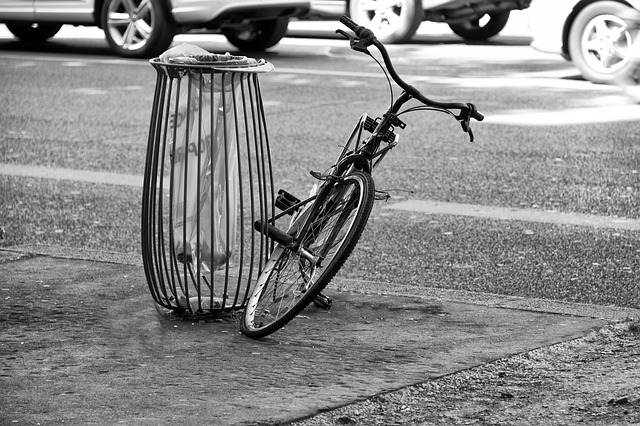Father and son stand on the quay of the Tiber, contemplating their next move. Antonio’s thin and wavering form towers over his baby-faced son. The pair has failed to find Antonio’s stolen bicycle. Both wear defeated expressions. The future looks grim. Antonio cannot work at his job plastering the city in advertisements without a bike. The modern city requires mobility and his has just been taken.
They stand in front of a restaurant, a proper place with coiffed children eating pasta and waiters in button down shirts and aprons. Antonio knows he cannot afford lunch out but offers his son a pizza nevertheless. As they walk towards the restaurant he says, “Why should I kill myself worrying if I just end up dead?” He is desperate but refuses to give in to misery. Bruno lights up. The two enter excited to forget for a while both the bicycle thieves and the eventual return home empty handed.
A band plays perky tunes while bourgeois diners sit around in fine hats smoking, eating and drinking red wine. Antonio bursts into the restaurant. He hesitates in the entryway for a second, soaking in the line he has just crossed with his son in tow. They exchange a few glances—Bruno uncomfortable and unsure only proceeds after his father assures him that they can sit at a table in this restaurant. Antonio and Bruno take a table without a tablecloth. Behind them, a family eats lunch. The youngest son sits back-to-back with Bruno, hair greased just so in a crisp white shirt and button down. He pulls a melted cheese sandwich away from his mouth, stretching the curds to their limits.
Antonio tries to order a pizza. The waiter says, “This is not a pizzeria.” The distinction between pizzeria and restaurant surprises Antonio: a reminder, a gentle nudge, that this establishment serves other food to other kinds of people. Unlike the terraces and zinc bars in Nadja, the public at this restaurant is selective. The family just behind father and son serve as a counterpoint. That lunch is big and festive: pasta, sandwiches, abundant wine, laughter, tablecloths and clean hands. The diners leave concern and worry outside as they pass through the restaurant doors. They have the luxury of time and money, both of which buy them prolonged distance from the war-torn city beyond the restaurant walls.
Instead of pizza, Antonio orders mozzarella on bread and a whole bottle of wine, despite the waiter’s suggestion of a half. He tells Bruno to save room for dessert. Antonio beats along to the music while Bruno looks lost. Antonio gulps down his first glass and says, “We can do anything we want, we’re men.” He will not be restrained by social position. Eating lunch in this restaurant is a quiet provocation. They push the physical boundaries of the city by sitting at a table in such an establishment. In his choice to forget and to ignore his material circumstances, to indulge in the luxury of not working, Antonio insists on his and his sons’ right to the same spaces and food as the classes who have the permanent luxury of selective vision. (It is true that his wife is at home working throughout this whole scene, and whole film: the fact that they can do whatever they want because they are men is critical.)
The boy behind Bruno eats mozzarella on bread as well (what looks like a grilled cheese sandwich to me) with a fork and knife held properly and managed with grace. When the food arrives at his own table, Bruno tries to manage the fork and knife, oversized and awkward in his small hands. Antonio says that they will be happy for now. Bruno gives up with the cutlery and takes up the sandwich in his hands, pulling it and stretching the melted cheese to an impressive distance. He checks to see if the boy behind him has noticed—no. He sees what he wants to and when he wants to. Bottles of champagne arrive at that table while Bruno keeps pulling his sandwich, gobbling up the cheese, and pulling again, racing before the mozzarella gets too cold to stretch.
The floating pleasure of eating and drinking together lasts about a minute before Antonio remembers that his bicycle was stolen, they will have to pay the bill and leave the restaurant without the insurance of work the next day. He begins a set of sad calculations of the money that could have been were his bike locked up safe outside. An otherwise ordinary lunch scene displays the social and economic divisions of a city torn apart by war, struggling with development designed to leave certain people behind while others turn a blind eye. Through eating something different somewhere different, Antonio takes himself and his son on a brief trip to an alternate reality. It works for a short time. The mozzarella gets cold, the numbers add up, and they reenter the public.
*****
Nina Sparling currently lives in Paris where she is a middle school English teaching assistant. Between classes, she writes, waits tables, and bicycles to pass the time. After a year and a half working as a cheesemonger in Brooklyn, she likes to surprise people with fun facts about curd and convince the French that Americans can make cheese too. She also keeps an irregular blog, Salt to Taste, about cooking and eating without regard for details or Instagram.
Read more from Italy:

